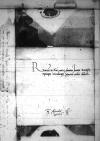List #5720
Sigismund I Jagiellon do Ioannes DANTISCUSCracow (Kraków), 1545-03-20
| odebrano Heilsberg (Lidzbark Warmiński), 1545-04-02 Rękopiśmienne podstawy źródłowe:
| ||||||||||
Tekst + aparat krytyczny + komentarzZwykły tekstTekst + komentarzTekst + aparat krytyczny
Reverendo in Christo Patri, domino
Reverende in Christo Pater, domine, sincere nobis dilecte.
Quod scribit Paternitas Vestra queri
Dat(ae) or Dat(um)⌈Dat(ae)Dat(ae) or Dat(um)⌉
Ex mandato s(acrae) or s(erenissimae)⌈s(acrae)s(acrae) or s(erenissimae)⌉ regiae maiestatis proprio


 BNW, BOZ, 953, f. 250v
BNW, BOZ, 953, f. 250v